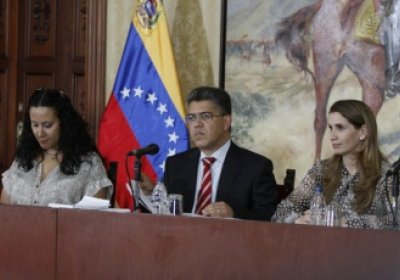Since Richard Nixon proclaimed the “War on Drugs” four decades ago, drug use around the world has skyrocketed.
From 1998 to 2008 alone, global opiate use rose 34.5%, cocaine 28% and marijuana 8.5%.
People in the US are the world’s largest users of cocaine, Colombian heroin, Mexican heroin and marijuana. When Nixon launched the “war”, his initial budget was US$100 million for the first year. This has ballooned year after year, until it was $15.6 billion for 2011.
Given this, here are many commentators who proclaim that the “war on drugs” has failed.
959
It takes more than an individual to upset the international chessboard as dramatically as it has been in the past decade.
Forces unleashed by the logic of capitalism have drawn a new geopolitical map, in which the United States has lost its former place as the world's centre of gravity and the ultimate arbiter of the key issues of the economy, politics and war.
Yet, though changes of such magnitude were obviously not the work of one person, the late Venezuelan president Hugo Chavez’s hallmark was a profound intuition of this impending change.
Washington has simultaneously called for cooperation from Venezuela and worked to undermine the oil-rich nation's interim government.
Shortly after the death of socialist president Hugo Chavez on March 5, the White House issued a statement expressing an “interest in developing a constructive relationship with the Venezuelan government”.
“As Venezuela begins a new chapter in its history, the United States remains committed to policies that promote democratic principles, the rule of law, and respect for human rights,” the statement read.
Venezuelan officials announced on Wednesday that they are breaking off talks with US diplomats, accusing the United States government of interfering in Venezuela’s internal affairs ahead of next month’s elections.
“This line of communication is now suspended, postponed until the United States gives a clear message about what kind of relationship they want,” announced Venezuela’s Foreign Minister Elías Jaua on Wednesday.
At the most highly contaminated US nuclear site, redundancy notices went out on March 18 to nearly 250 workers. More than 2500 others were notified they faced temporary layoffs of several weeks.
About 9000 people work at Washington State's Hanford Nuclear Reservation, which produced plutonium for US nuclear weapons during World War II and the Cold War.
Contractors are cleaning up the highly contaminated site and removing millions of gallons of radioactive waste for treatment at a plant now under construction.
Northern Territory Chief Minister Terry Mills was replaced by Adam Giles in a sudden leadership coup on March 13, while Mills was in Japan on a trade mission. This shift has led to backdowns from the Country Liberal Party (CLP) on some regressive policies but could pave the way for more attacks in the future.
Crikey’s Bob Gosford predicted the spill on March 5 and wrote a detailed account of it.
Having tried absolutely everything they could think of to win the support of voters besides push good polices in favour of working people, there was really nothing for Labor's parliamentary caucus to do except launch yet another leadership spill on March 21.
It might have been a farce that will help worsen Labor's defeat in September, but it did reveal one startling fact: Simon Crean is still in parliament. I know, right?
The Victoria Refugee Action Collective held a forum on March 20 called “Persecuted in Sri Lanka, detained in Australia: the plight of Tamil refugees”.
Former journalist Trevor Grant said the Australian public has been taught to be fearful of refugees. The language used to speak about them — including terms such as “illegal” and “border protection” — is designed to create fear.
Grant, who is active in the Tamil Refugee Council, spoke of the use of torture and rape by Sri Lankan government forces against Tamils.
There has long been support across Australia for sustainable job creation. With new environmental technologies being created at a rapid pace, green jobs have been created in installation and retail — but what about sustainable manufacturing?
There is now a push for sustainable jobs that consider the future of communities where local jobs are reliant on coal, such as Morwell in Victoria’s Latrobe Valley.
The mining companies’ best friend in the federal Labor government, former resources minister Martin Ferguson, supported a Kevin Rudd comeback and fell on his sword after the Labor leadership spill-that-wasn't.
Ferguson said he was resigning from cabinet and retreating to the backbench on March 22.
He said: “The class-war rhetoric that started with the mining dispute of 2010 must cease. It is doing the Labor party no good."
He appealed for Labor to "govern for all Australians" like the Hawke and Keating governments supposedly did.
A protest against racism outside Labor MP Tanya Plibersek's office on March 21 demanded an end to the Northern Territory intervention and its expansion into areas such as Bankstown in south-west Sydney.
Stop the Intervention Collective Sydney (STICS) organised the rally, which highlighted the small but significant steps being taken to bring Aboriginal communities, unions and others together to prevent the spread of these apartheid-like policies.
The protest was held on International Day for the Elimination of Racial Discrimination and national Close the Gap day.
When coal seam gas company Metgasco announced on March 13 it had suspended its operations in northern NSW after a long community campaign against it, it was just the latest in a series of setbacks for the CSG industry.
It followed the suspension of an AGL project in Campbelltown in western Sydney after community protests. Another company, Arrow Energy, has withdrawn from NSW and wants to transfer its licence to Dart Energy so it can focus on expanding in central Queensland.
- Previous page
- Page 2
- Next page






